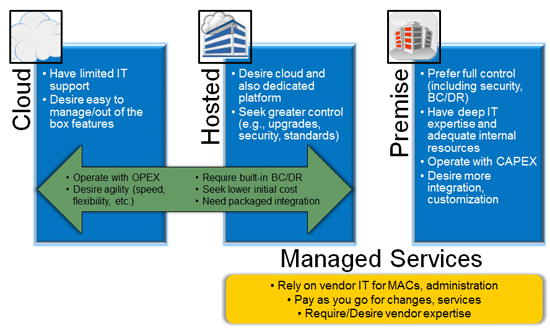The number and types of vendors offering contact center solutions has grown dramatically. Cloud, hosted, and managed service providers provide broad functionality, often with innovative licensing arrangements. Seasoned premise solution players make long-proven capabilities available in the cloud. And they are all pursuing centers across a wide spectrum of sizes and vertical markets.
The proliferation of vendors and sourcing options often confounds buyers tasked with securing the perfect choice for their centers. Even the terminology used to describe sourcing options creates confusion.
A “cloud” solution does not necessarily mean that all routing and contact processing happens at the vendor’s data centers. Many offer a “hybrid” approach that allows customers to terminate local and toll free lines into their systems. Vendors may also allow or require placement of equipment on site to optimize performance and/or deployment costs – e.g., to capture voice and screen interactions as part of a quality monitoring solution.
Some folks consider “hosted” solutions as interchangeable to cloud, but there can be differences. A pure cloud solution is typically multi-tenant, meaning multiple customers utilize a single set of application servers. Some cloud vendors are single tenant, where a customer is on a dedicated system in the vendor’s data center. Single tenant solutions are often referred to as hosted.
“Managed services” typically describes a solution that is installed, supported, and owned by a third-party vendor that “leases” the functionality back to its customers on a subscription basis. It can be used to provide robust premise or hosted services that position the vendor (or their partner) as the equivalent of your IT shop for moves, adds, and changes, new application design and development (e.g., on IVR), routing and reporting changes, etc.
For many companies, the decision to utilize a cloud vendor for contact center technology is an easy one. Common motivations include lack of personnel trained in or focused on contact center technology, need more sophisticated tools, such as multimedia routing and call recording, and a desire to fund technology with operating versus capital expense. Yet even for centers with dedicated IT support and relatively advanced technology, the cloud is enticing.

Whether you are a committed convert or grappling between cloud and premise-based contact center solutions, you need to go into an evaluation process with full knowledge of the key differentiators. I’ve just published an article entitled Know Before You Go: A Path to the Cloud that presents premise and cloud solution comparisons in the following categories: investment, capabilities, speed, architecture, support, and security. It’s a good starting point to help you narrow your search parameters as you navigate your decision process.
